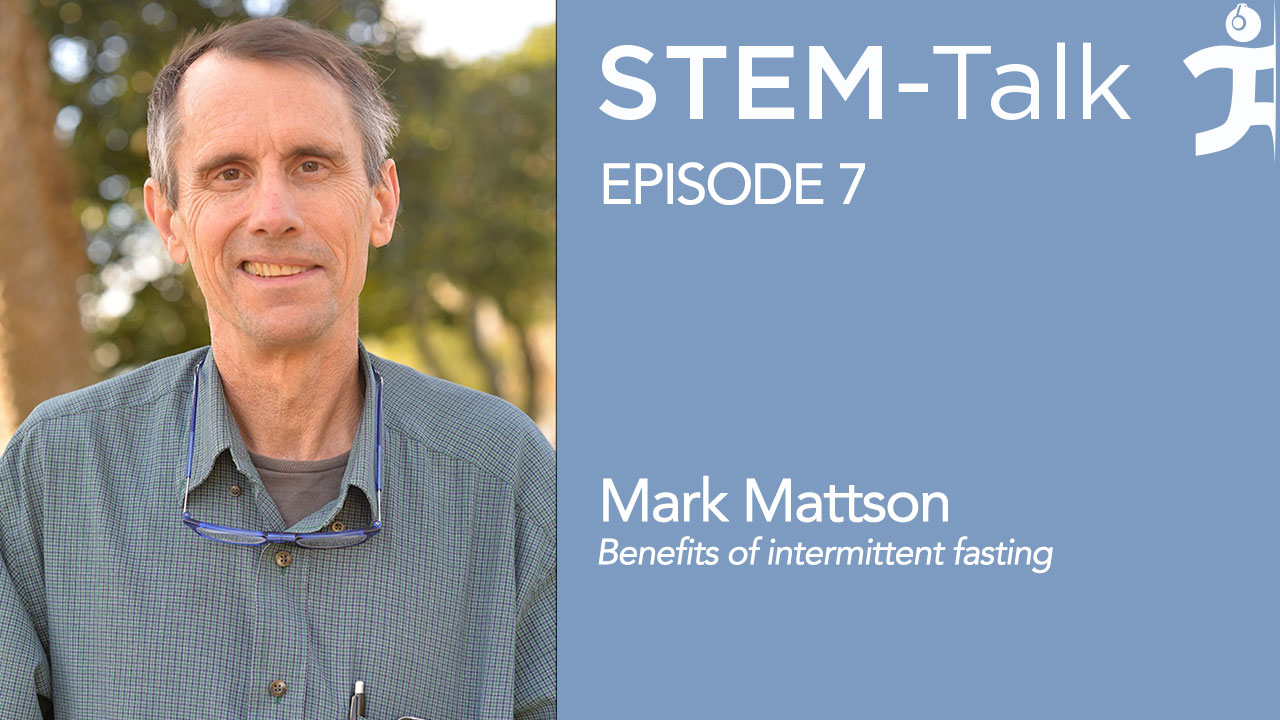STEM-Talk
Episode 7: Mark Mattson talks about benefits of intermittent fasting
// Apr 12, 2016

Intermittent fasting—alternating days in which you fast or eat only a few hundred calories a day—may have significant long-term health benefits, according to some researchers.
Mark Mattson is a leading expert on intermittent fasting, and one of its proponents on a personal level as well. As a neurosciences professor at Johns Hopkins University, and chief of the laboratory of neurosciences at the National Institute on Aging (NIA), Mattson is particularly interested in how fasting can improve cognitive function and reduce the risk of neurodegenerative diseases.
Intermittent fasting might play a role in preventing or postponing neurodegenerative disorders such as Alzheimer’s, which fifty percent of Americans living into their eighties are predicted to get.
In this episode, Mattson talks with IHMC Director Ken Ford and IHMC visiting research scientist Dominic D’Agostino about the benefits of fasting and the physiological mechanisms behind those benefits.
Mattson is a prolific scientific researcher, and you can find links to some of his work at Mattson ARR 2015 ; Mattson Cell Metabolism 2012 ; and Mattson Sci Amer 2015.
Mattson recently delivered an excellent lecture at IHMC on intermittent fasting and optimizing cognitive performance: http://tinyurl.com/zc2xxhc. You can also find his TED talk at http://tinyurl.com/nt24z5p.
For more information on Mattson’s career and research, check out his Wikipedia page: http://tinyurl.com/gmpd3we
1:30: Ford says, “Intermittent fasting has become very popular and Mark Mattson is, in our view, the premier authority on this matter.”
2:30: Ford reads iTunes five-star review from “Carl”: “Really smart, really interesting people being interviewed by the same. IHMC is a fascinating place, and attracts like-minded people.”
3:57: Mattson’s interest in science began in ninth grade, when he wrote an essay on cryopreservation.
4:29: He got interested in aging during his Ph.D., while studying developmental neurobiology and cell death.
6:37: Mattson spent eleven years at the University of Kentucky at the Sanders Brown Center on Aging.
7:20: Mattson explains the basic rationale behind intermittent fasting: If you challenge yourself/cells bio-energetically through exercise or fasting, nerve cells respond adaptively—and pathways are activated that increase neuronal resistance to stress and age-related neurodegenerative disorders.
8:10: Mattson conducted studies in which he subjected animals to alternative day fasting, with a 10-25 percent calorie-restricted diet on the days in which they ate. “If you repeat that when animals are young, they live 30 percent longer.” The animals’ nerve cells were more resistant to degeneration.
10:10: Mattson explains the “5:2” study: There were one hundred women in two groups: one group ate 25 percent fewer calories daily; the other group ate only 500 calories/day for two days.
10:57: The take-home message: “Women on the 5:2 diet lost more body fat, retained more lean muscle mass, and had an improvement in glucose regulation. This is consistent with what we know about fasting in terms of general energy metabolism.”
12:08: Fasting for 12 or more hours causes fatty acids to go into the blood stream/liver and are converted into ketones, which are a good alternative energy source for cells.
13:00: Mattson describes how fasting may benefit the brain.
14:20: Mattson talks about three types of fasting regimens: the 5:2 diet; alternate day fasting (500-600 calories on “fasting” days); and time-restricted feeding, where you limit time window that you take in calories to six to eight hours.
16:58: Mattson explains the following dietary “myths”: breakfast is the most important meal of the day; it’s necessary to eat three meals a day; it’s healthier to eat mini meals throughout the day than one or two big meals. “Largely this isn’t based on any good science that we can find.”
17:44: Fasting can elevate ketones to high levels—even those higher than are typically induced on a ketogenic diet.
19:34: Ketogenic diets are still used in some patients with epilepsy, and they work.
20:36: Mattson and others have found that both exercise and fasting increase levels of BDNF (brain-derived neurotrophic factor) in the brain.
20:42: We think BDNF is a key mediator of the anti-depressant effects of exercise as well as the most commonly used anti-depressant drugs. Beta-hydroxybutyrate increases BDNF production, which is also important for learning and memory; and neurogenesis.
22:09: Commercial break: STEM-Talk is an educational service of the Florida Institute for Human and Machine Cognition (IHMC), a not-for-profit research lab pioneering ground-breaking technologies aimed at leveraging human cognition, perception, locomotion and resilience.
23:00: There is interest in doing controlled clinical trials to test the efficacy of exogenous ketones to enhance brain health. Also, some ongoing trials are looking at the effect of coconut oils and branch chain amino acids on Alzheimer’s Disease.
23:55: There’s been no drug effective in slowing down the disease process in Alzheimer’s Disease.
24:15: With age-related diseases, the biggest impact will be on risk reduction: identifying what people can do in mid-life to reduce the risk of getting these diseases when they get into their seventies and eighties.
25:18: Data now show that if you live to your eighties, you almost have a 50 percent risk of getting Alzheimer’s Disease before you die.
25:42: Studies show that exercise and ketones benefit Parkinson’s Disease patients.
26:47: Ford discusses a recent study that shows that autophagy is a critical regulator of stem-cell fate, with implications for fostering muscle regeneration in sarcopenia. Autophagy typically declines with age and this may cause stem cells to lose their “steminess” and become senescent. Both intermittent fasting and ketosis increase autophagy … asks Mattson if this might this account for some of the common benefit sometimes seen in both strategies? Mattson concurs.
27:36: During the bio-energetic challenge of exercising or fasting, autophagy is increased; in part by inhibiting mTOR. Cells go into a protective mode, reducing overall protein synthesis, and at the same time, improving their ability to remove “molecular garbage.”
28:55: The cells’ recovery period is important for increased protein synthesis, and the growth of muscle cells, dendrites and new synapses. All this could be preventive for sarcopenia.
30:00: Mattson says that it is possible to gain muscle during intermittent fasting, which does not necessarily mean caloric restriction.
31:07: There is quite a bit of evidence that high protein intake is not good for aging.
33:04: Mattson himself practices time-restricted feeding. For four to five days a week, he doesn’t eat breakfast or lunch. Then he will eat after working out and in the evening. “I think I’m more productive this way.” Following this regimen, he has also maintained the same body weight for thirty years.
34:12: D’Agostino, Mattson and Ford discuss training while fasted.
36:22: “There’s no really solid scientific basis that would support a claim that three meals a day is the healthiest approach.” In fact, it’s very unusual from an evolutionary perspective.
37:00: Mattson’s diet includes fruits, veggies, nuts, fish, yogurt, whole grains, and beans. “At least half my calories are from complex carbohydrates.”
37:48: Exercise changes nerve cell circuits involved in cognition. Antidepressant drugs have a similar effect.
41:13: Plato wrote that he did some of his best thinking while fasting. Upton Sinclair wrote “A Fasting Cure,” and even Mark Twain touted the benefits of fasting.
41:41: “You are able to think more clearly in a fasted state; and you begin to contemplate things that you wouldn’t normally think about if you were in a more satisfied energetic state.”
43:26: The impetus for eating mini meals came from working with diabetes patients. The thinking was, ‘It’s important to avoid big spikes in glucose.’ But evidence shows fasting is better than mini meals for regulating insulin sensitivity.
45:10: Within about one month, people adjust to a fasting diet.
49:45: Discussion of possible benefits of intermittent activation of mTOR as opposed to chronic low mTOR or continually activated mTOR.
51:45: Mattson explains his role at the NIA as chief of the laboratory of neurosciences. The organization of research at each institute is divided into labs, which are roughly equivalent to departments at a university.
53:15: Most cancer cells rely on glucose and are not able to metabolize ketones. Intermittent fasting and/or ketogenic diets, sometimes in combination with chemotherapy, may slow or stop tumor growth—and perhaps even protect normal cells.
54:56: Ford and D’Agostino thank Mattson for a great interview.
55:10: Kernagis and Ford discuss interview and wrap-up show.






